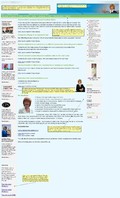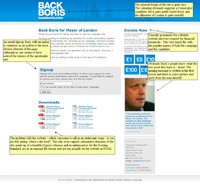A little wait for this one, as it has taken me a while to get round to doing it, but here is the final Conservative Mayor Idol, Warwick Lightfoot. Lightfoot is a former government special advisor who has also served as a councillor in Kensington and Chelsea for a number of years. And here's his website:
First thing to say: It's loooooooooooooooonnnnnnnnngggggggg..... And it isn't even in blog format (by which I mean having entries tagged and organised, and published in chronological order). They just seem to have crammed loads of information on to the homepage, and it is a bit of a mess. The obvious solution to this would be to have a nice, self-contained front page and a blog. But the site has no blog, which is a big limiting feature. Most of the content on the front page of the site comes from press releases. Whilst these are clearly well-ordered and up-to-date (there is a release on today's tube strike for example), it also says something about the type of audience that the site is reaching out to - namely the mainstream media.
The site does have some nice features. For example, it has podcasts on it (which are actually called podcasts and have an RSS feed). And there is an RSS feed for content. Although, once again, I am left wondering why anyone - unless they were a jounro - would subscribe to a dry, press release-based feed? Successful political blogging, as everyone since Dean '04 has showed, is about personality and humour, as much as it is about policy and organisation. Without that, I suspect that the number of people subscribing to a feed will be very low.
Overall, whilst the site, looks OK (aside from the extreme length of the homepage), has quite a lot of stuff on it, and, I have no doubt, would be useful to a journalist, something really, really big is missing - the site is almost completely lacking in interactive features. Basically, these are limited to an email address, the ability to sign a supporters list and donating. There is no option to publicly comment anywhere. And as all the media is held on the site, and doesn't use a third party site such as YouTube, there is no possibility of commenting on or rating it. There are not even online polls. And, given the populist nature of London Mayoral contest, that really misses a trick.





